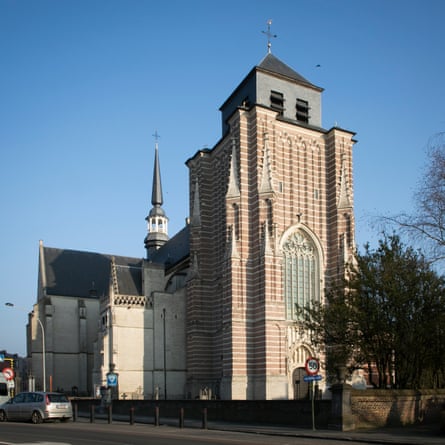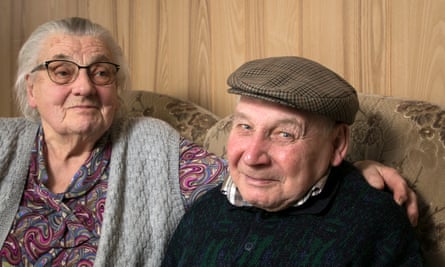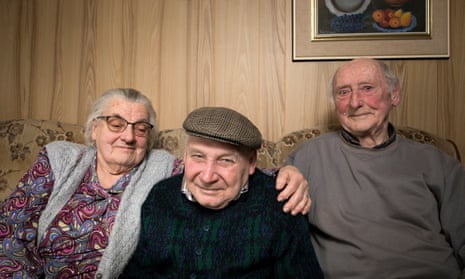Maria Lenaerts was seven years old when she came home from school one day to find a stranger at the kitchen table. It was September 1942 in Nazi-occupied Belgium.
The young man looked afraid. He did not say a word to her. “He was sitting at the table like this,” she recalls, hiding her head in her arms. “He didn’t understand anything.”
This was her first encounter with Jefkae Harbant, then an 18-year old with a learning disability and no place to call home. He was born in the French-speaking part of Belgium and did not speak a word of Dutch. Neither Maria nor her parents knew any French.
Quick GuideWhat is the Upside?
Show
Ever wondered why you feel so gloomy about the world - even at a time when humanity has never been this healthy and prosperous? Could it be because news is almost always grim, focusing on confrontation, disaster, antagonism and blame?
This series is an antidote, an attempt to show that there is plenty of hope, as our journalists scour the planet looking for pioneers, trailblazers, best practice, unsung heroes, ideas that work, ideas that might and innovations whose time might have come.
Readers can recommend other projects, people and progress that we should report on by contacting us at theupside@theguardian.com
Despite the language barrier, Maria’s parents, who were cattle farmers in the Flemish lowlands, had decided to take the young man in. This was not only an act of wartime charity, but came from a centuries-old tradition of stretching out a hand to people on the margins of society.
For hundreds of years, residents in the Belgian town of Geel have been giving a home to strangers with severe mental health problems or learning disabilities.
This is not a bed for a night or a few weeks. Many boarders stay with the same family for years, often decades. Somehow a tradition from the age of Chaucer has survived and evolved into part of Flanders’ state healthcare system. In 2018, 205 people are Geel boarders, although home care is now only for those with mental health problems, not learning disabilities.
In an age that is more aware of the crushing toll of mental illness, the homecare system has made this small town near Antwerp a curiosity. One in four people will experience mental health problems in their lives, according to the well-known World Health Organisation estimate, while a majority say their pain is deepened by stigma.
Geel’s model of acceptance and “radical kindness” – to cite one medical journal – has stirred interest around the world. Academics and journalists have flocked to the small Flemish town searching for inspiration from an “innovation” that is 700 years old.
Geel traces its boarding tradition to the 13th century, when people with all kinds of illnesses made a pilgrimage to the local Saint Dymphna’s church. According to the brutal legend, Dymphna was an Irish saint who was murdered in the town. Pilgrims travelled many miles to her church in Geel, searching for miracle cures. When there was no more room in the church sick bay, locals gave them a place to stay.
The Geel homecare tradition was incorporated into the state in the 19th century, eventually ending under the umbrella of the Psychiatric Care Centre (OPZ). Most boarders have severe mental illnesses, such as schizophrenia or personality disorder. “They have a long history of disease and referrals. They are not capable of living alone,” says Mieke Celen, a psychiatrist at OPZ, who oversees the matchmaking process between foster families and patients.
Foster families are never told the patient’s diagnosis, although they do get warning about behaviour that they might expect: can they live with someone who smokes or walks around the house during the night? Dr Celen says few relationships break down.
One study of 17 foster relationships over five years, by the Belgian academics Eugeen Roosens and Lieve Van de Walle, found that only two families dropped out of the programme during the period.
Geel’s medical professionals say the system makes a lot of sense. Boarders have better outcomes than patients in hospital: they take less medication and have fewer acute episodes, says Celen.
Success means “having a life as normal as possible”, says Wilfried Bogaerts, an OPZ psychologist. “The programme is about life. It is not a miracle cure, it is not a magic system, but it is about finding this person the right place to live at the right time.
“Very often there is a severe chronic problem that cannot be cured completely, so we try to make the best of it. We accept the limitations but then try to make the life of a boarder as good as possible.”

For advocates, Geel’s forte is seeing the person, not a bundle of stigmatised labels straight from a medical textbook. Boarders are given responsibilities in the household, says Bogaerts: “They take care of the dog, go to the shop, do the dishes … so patients are needed and wanted.”
For some observers, there is not enough evidence that the scheme really works. “There has been very little evaluation about the impact of this,” says Professor Sir Graham Thornicroft at King’s College London. “In terms of outcomes for individuals, we don’t know about readmission rates, or satisfaction rates, or quality of life, or things we would normally want to assess for people with long-term needs.”
Jefkae Harbant is exceptional, even by the standards of Geel family care. When the Guardian visits, his 94th birthday is only a few days away. A cake has been ordered. Friends invited. There will be a family party.
He still remembers the day he arrived on the family farm nearly 76 years ago. “He was not afraid, but it was difficult for an 18-year-old boy who came to an unknown environment,” recounts his care worker, Michelle Lambrechts, who acts as an interpreter.
Maria is now 82 and has lived with Jefkae nearly all her life. When her father died in 1982, she became his foster “mother”, even though she is younger.
After decades under the same roof, legal formalities have melted away. He is really a brother, she says, speaking through an interpreter, sitting in the house she has lived in all her life. There was was never a question that he would leave the family.
Harbant’s foster father is Maria’s husband, Jules Teunkens, a retired glass-factory worker, now 86. Maria and Jules married in 1957. A 60th wedding anniversary mug bearing their black and white younger selves is sitting on a shelf crowded with bric-a-brac. While her husband worked at the factory, Maria Lenaerts brought up their three children and worked on the family farm. And Jefkae helped, milking the cows and tending vegetables.

The family are rarely apart. Although social services offer respite care for holidays, Harbants does not like to stay at the hospital, recounts Lambrechts. “When Jefkae went to the ward, he cried a lot. He cries and he cries for hours because he doesn’t want to sit on the ward – he wants to be at home.”
The number of families who take in boarders is in sharp decline, as Geel’s rural, churchgoing traditions fade into the past. More women are working. Fewer people farm the land. The traditional foster family is disappearing.
Demand from patients is also falling. People with severe mental health problems no longer face the stark choice of hospital or boarding; many are opting for other kinds of residential care.
Geel reached its peak on the eve of the second world war, when 3,736 borders lived in the town. The numbers have been falling ever since and the decline has accelerated in the last two decades: in 2006 there were 46o borders, today 205. Younger families are proving hard to attract.
The OPZ thinks the Geel model can survive, but would like the state to increase payments to families from the current maximum of €600 (£535) a month. “The openness of the community is pretty high,” Bogaerts says. “We should compensate families more so it is more attractive.”
Maria Lenaerts would recommend taking in boarders, yet she doubts that the system fits with how people live now. “It won’t last,” she says. “People have a lot of activities and recreation – they don’t have time.”
None of her children or grandchildren have taken in any boarders.
This article is part of a series on possible solutions to some of the world’s most stubborn problems. What else should we cover? Email us at theupside@theguardian.com
